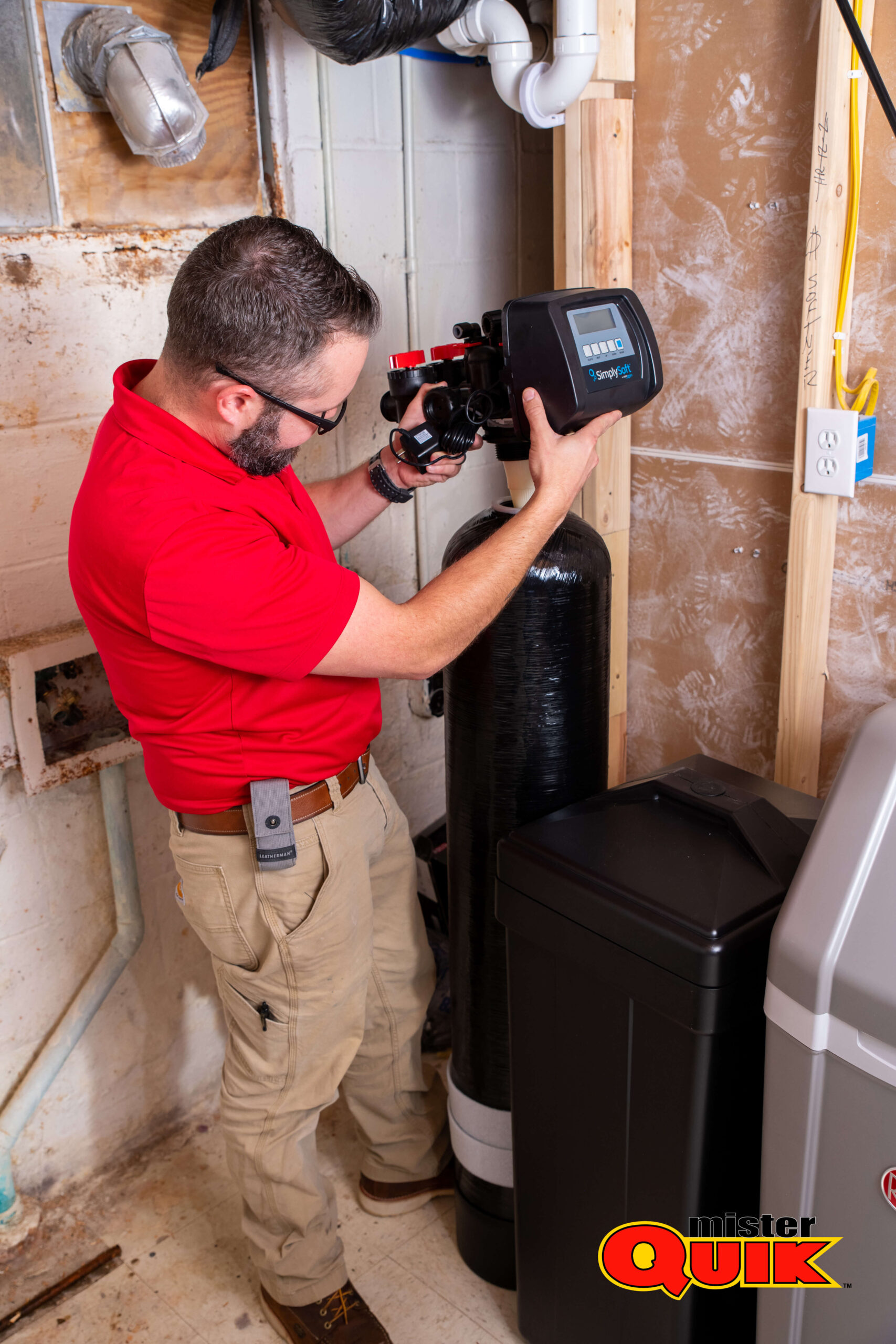Fishers Water Softeners

Water softeners for home
Are you tired of dealing with the frustrations of hard water wreaking havoc on your home and appliances? Understanding the ins and outs of water softeners can be the key to unlocking a solution for your water quality woes. Let’s dive deeper into the world of water softeners for home use to shed light on how they work and the benefits they bring:
- Hard Water Woes:
- Limescale Buildup: Hard water, laden with minerals like calcium and magnesium, can leave behind unsightly limescale deposits on faucets, showerheads, and surfaces.
- Soap Scum: The mineral content in hard water reacts with soap, forming a stubborn residue known as soap scum that clings to bathtubs, sinks, and dishes, making cleaning a constant battle.
- Appliance Damage: The minerals in hard water can accumulate in appliances like water heaters, dishwashers, and washing machines, reducing their efficiency and lifespan over time.
- How Water Softeners Work:
- Ion Exchange Technology: Water softeners employ ion exchange resin beads to attract and remove calcium and magnesium ions from hard water.
- Regeneration Process: Periodically, the resin beads need to be regenerated by flushing them with a brine solution, typically composed of salt, to recharge their ability to soften water effectively.
- Benefits of Softened Water:
- Improved Cleaning: Softened water lathers more easily with soap and detergents, resulting in cleaner dishes, brighter laundry, and a more refreshing bathing experience.
- Extended Appliance Lifespan: By reducing mineral buildup in appliances, water softeners help them operate more efficiently and last longer, saving you money on repairs and replacements.
- Types of Water Softeners:
- Salt-Based Water Softeners: These traditional systems use salt to regenerate the resin beads, requiring periodic refilling of the salt tank.
- Salt-Free Water Conditioners: These alternative systems use potassium chloride or other technologies to neutralize minerals without adding sodium to the water, making them a suitable option for those concerned about sodium intake.
Benefits of water softeners
Water softeners play a crucial role in enhancing the quality of water in your home, offering a multitude of benefits that extend beyond simple water conditioning. Let’s delve deeper into the advantages of water softeners to provide you with a comprehensive understanding:
Hard water contains elevated levels of minerals like calcium and magnesium, which can lead to the buildup of limescale in pipes, appliances, and fixtures. A water softener effectively removes these minerals, preventing scale accumulation and prolonging the lifespan of your plumbing system.
The prevention of mineral buildup not only benefits your pipes but also extends the lifespan of water-using appliances such as dishwashers, washing machines, and water heaters. By reducing the strain on these appliances, water softeners can help you avoid costly repairs and replacements.
Softened water requires less soap and detergent for cleaning tasks due to its improved lathering capabilities. This results in cleaner dishes, softer laundry, and potentially lower detergent costs, making household chores more efficient and cost-effective.
Hard water can strip the skin and hair of natural oils, leading to dryness, irritation, and dullness. Soft water, on the other hand, is gentler and less abrasive, helping to maintain the skin’s moisture balance and leaving hair feeling smoother and more manageable.
Water softeners prevent mineral deposits from adhering to plumbing fixtures such as sinks, showers, and faucets, resulting in cleaner surfaces with less frequent cleaning required. This not only saves you time and effort but also maintains the aesthetic appeal of your bathroom and kitchen
The absence of mineral buildup in softened water preserves the color and texture of clothing and linens during washing. Fabrics emerge brighter and softer, free from the stiffening effects of hard water, providing you with greater comfort and satisfaction.
By preventing limescale buildup in water heaters and pipes, water softeners improve energy efficiency. When appliances operate more efficiently, they consume less energy, leading to lower utility bills and reduced environmental impact.
Using a water softener reduces the need for harsh chemical cleaners, as softened water requires fewer cleaning products to achieve satisfactory results. Additionally, by extending the lifespan of appliances and reducing energy consumption, water softeners contribute to a more sustainable household environment.
Soft water produces significantly less soap scum on surfaces, reducing the need for frequent cleaning and minimizing the use of cleaning products containing harsh chemicals. This not only simplifies cleaning routines but also promotes a healthier indoor environment for you and your family.
By preventing scale buildup and corrosion in pipes, water softeners help maintain the integrity of your plumbing system. This reduces the risk of leaks, blockages, and other plumbing issues, ultimately saving you money on repairs and ensuring the long-term functionality of your home’s water infrastructure.
Home water softeners, also called ion exchange units, are appliances that remove calcium, magnesium, and other minerals from drinking water. Resin beads inside the softener trap the calcium and magnesium and exchange them for sodium or potassium.
Salt-based water softeners are the most commonly used and effective softener types. Most water softener systems are salt-based systems, so there are a high number of salt-based options available. They come in a variety of sizes and are appropriate for just about every dwelling.
While most softened water is perfectly safe to drink, the amount of sodium in the treated water will depend on the hardness of the original water. If the water hardness is below 400 ppm calcium before you soften it, then you can drink it with little concern.
The lifespan of water softeners can vary depending on factors such as the quality of the unit, usage patterns, maintenance, and water hardness levels. Generally, well-maintained water softeners can last anywhere from 10 to 20 years or more. However, some components may require occasional replacement or servicing to ensure optimal performance and longevity. Regular maintenance, such as replenishing salt or resin, cleaning the brine tank, and checking for leaks or malfunctions, can help extend the lifespan of a water softener.
To maintain a water softener, regularly check and replenish salt levels in the brine tank, clean the brine tank periodically to remove any sediment buildup, and ensure proper function by checking for salt bridges or mushing. Additionally, clean the resin bed annually using a specialized resin cleaner to remove accumulated minerals and debris, and monitor for any leaks or malfunctions in the system.
Water softeners maintenance
Maintaining your water softener is crucial for ensuring the continued supply of soft, clean water throughout your home. Let’s delve deeper into the intricacies of water softener maintenance:


- Check the salt level in your water softener at least once a month, as low salt levels can lead to hard water bypassing the system and entering your plumbing.
- Keep the salt tank adequately filled to maintain the brine solution’s saturation level, which is essential for effective ion exchange and water softening.
- Every three to six months, clean the brine tank to prevent salt buildup, sediment accumulation, or the formation of salt bridges.
- Use a mixture of water and vinegar or a specialized resin cleaner to scrub the tank’s interior, ensuring that the brine solution remains free-flowing and effective.
- Periodically review and adjust the settings on your water softener based on changes in water hardness or household water consumption.
- Ensure that the regeneration frequency, salt dosage, and hardness settings are appropriately calibrated to optimize the system’s performance.
- Conduct a resin bed cleaning or regeneration cycle as recommended by the manufacturer to remove accumulated minerals and restore resin bead functionality.
- Follow the manufacturer’s guidelines meticulously to prevent over-regeneration, which can lead to resin degradation or insufficient softening capacity.
- Routinely inspect all components of your water softener system for leaks, including valves, fittings, hoses, and the brine tank.
- Address any leaks promptly to prevent water wastage, potential damage to the softener, or water damage to your home’s infrastructure.
By incorporating these additional maintenance practices into your routine, you can enhance the longevity and performance of your water softener while enjoying the benefits of softened water throughout your home. Trust Mister Quik Home Services in Fishers for expert guidance and assistance with all your water softener maintenance needs, ensuring a continuous supply of soft, high-quality water for your household.
Water softeners near me
Searching for water softeners near you in Fishers? Let’s delve into the intricacies of water softeners to help you find the perfect solution for your home:




Assessing the hardness of your water is crucial as it determines the amount of minerals like calcium and magnesium that need to be removed by the water softener for optimal performance.




There are various types available, including salt-based, salt-free, and dual-tank systems. Each type offers unique benefits and considerations, such as efficiency, maintenance requirements, and compatibility with your water usage patterns.




Selecting the right size and capacity of the water softener depends on factors such as the size of your household, daily water usage, and the hardness of your water. Ensuring adequate capacity ensures consistent soft water supply for your needs.




Salt-based water softeners require periodic regeneration to recharge the resin beads that remove hardness minerals. In contrast, salt-free alternatives employ methods like template-assisted crystallization (TAC) for scale prevention without the need for regeneration.




Proper installation by a qualified professional is essential for optimal performance and longevity. Additionally, regular maintenance, such as resin bed cleaning or salt replenishment, helps ensure efficient operation and prolongs the lifespan of your water softener.




Begin by researching local plumbing and home service providers in Fishers. Look for reputable suppliers and installers with a track record of quality products and excellent customer service.




Consider factors such as product quality, warranty coverage, customer reviews, and pricing when comparing different options available in your area. A reputable provider will offer transparent pricing and expert advice to help you make an informed decision.




Consult with a professional plumber or water treatment specialist to assess your water quality and recommend the most suitable water softener solution for your specific needs and budget. They can provide personalized recommendations based on your unique circumstances and preferences.




In conclusion, exploring water softeners near you in Fishers equips you with the knowledge needed to invest in a water treatment solution that meets your needs and ensures the quality of your household water supply.
Water softeners service near Fishers
Are you seeking a reliable water softener service near Fishers to improve the quality of your home’s water supply? Understanding the nuances of water softening services ensures informed decision-making. Let’s delve into the details to help you find the ideal solution:
1.Importance of Water Softening:
- Water softeners remove mineral deposits like calcium and magnesium, enhancing water quality.
- Softened water extends the lifespan of appliances, reduces soap scum, and improves skin and hair health.
2.Signs You Need a Water Softener:
- Hard water indicators include dry skin, limescale buildup, and mineral stains on fixtures.
- Soap doesn’t lather well, and clothes feel stiff after washing, indicating the need for softening.
3. Choosing the Right Water Softener:
- Consider factors like water hardness levels, household size, and budget when selecting a system.
- Options range from traditional ion exchange systems to salt-free alternatives and dual-tank models.
4.Professional Installation Benefits:
- Proper installation ensures optimal performance and avoids damage to plumbing systems.
- Trained technicians can assess water quality, recommend suitable systems, and handle installation efficiently.
5.Maintenance and Servicing:
- Regular maintenance, including resin bed cleaning and salt replenishment, is essential for continued efficacy.
- Schedule periodic servicing to inspect and recalibrate systems, ensuring they operate at peak efficiency.
Understanding water softeners and their service options near Fishers empowers homeowners to make informed choices for their water quality needs. For reliable water softener solutions tailored to your requirements, trust Mister Quik Home Services in Fishers.
With Mister Quik Home Services, you can enjoy peace of mind knowing your water softener service needs are in expert hands, ensuring your home’s water quality is optimized for comfort and convenience.
Water softeners cost in Fishers
Understanding the cost of water softeners in Fishers is essential for homeowners seeking to improve their water quality. Let’s explore the various factors that influence water softener costs to provide you with comprehensive insight:
Different types of water softeners, such as salt-based, salt-free, or dual-tank systems, vary in price based on their technology and capabilities.
The size and capacity of a water softener determine its effectiveness in treating hard water. Larger capacity units typically come with higher price tags but can accommodate larger households and higher water usage.
Established brands and high-quality water softener systems may be priced higher initially but offer superior performance, durability, and warranty coverage, potentially reducing long-term maintenance and replacement costs.
Additional factors such as installation complexity, plumbing modifications, and labor costs can influence the overall cost of installing a water softener system in your home.
In addition to the initial purchase and installation costs, homeowners should budget for ongoing maintenance expenses, including salt or potassium refills, filter replacements, and periodic system servicing. Regular maintenance helps ensure optimal performance and longevity of the water softener system, reducing the risk of costly repairs or premature replacement.
In conclusion, understanding the factors influencing water softener costs in Fishers empowers homeowners to make informed decisions when investing in water treatment solutions.
For expert guidance on water softeners and professional installation services, trust Mister Quik Home Services in Fishers. We’re committed to providing reliable solutions tailored to your needs, ensuring your household enjoys the benefits of softened water.
- Ensure salt levels are adequate in the brine tank to facilitate effective ion exchange.
- Low salt levels can lead to hard water bypassing the system, causing mineral buildup.
- Regularly clean the brine tank every three to six months to prevent salt buildup or sediment accumulation.
- Use water and vinegar or a specialized cleaner to maintain the brine tank’s effectiveness.
- Periodically review and adjust settings based on changes in water hardness or household water usage.
- Ensure regeneration frequency, salt dosage, and hardness settings are calibrated for optimal performance.
- Conduct resin bed cleaning or regeneration cycles as recommended by the manufacturer to remove mineral buildup.
- Follow manufacturer guidelines to prevent over-regeneration and maintain resin bead functionality.
- Routinely inspect all components for leaks, including valves, fittings, hoses, and the brine tank.
- Promptly address any leaks to prevent water wastage and potential damage to the softener or home infrastructure.









